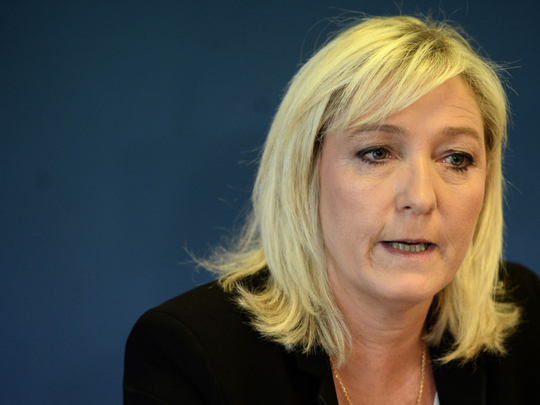
Piece by piece, France is gearing up for the next presidential election in May 2017. Last month, National Front (FN) leader Marine Le Pen kicked her father Jean-Marie Le Pen out of the party he had created decades ago. He was becoming increasingly dangerous, with uncontrolled outbursts. As anticipated, his vociferous shouting amounted to nothing and a page has now been turned.
At the Socialist Party (PS), the good news for President Francois Hollande was the success of his followers at a pre-Congress voting session — bagging more than 60 per cent of the votes, thereby sidelining the so-called frondeurs, a grouping of leftist opponents who claim Prime Minister Manuel Valls’ policy is “social-democratic” — that is, not “leftist” enough. A direct consequence has been the re-election of Jean-Christophe Cambadelis, Hollande’s man at the helm of the party, as general secretary. An indirect consequence is the assumption that from now on, there is no hindrance to Hollande running again and also that he may not have to go through the internal “primaries” aimed at choosing a single candidate.
As for the former centre-right UMP, it died last Saturday only to re-emerge under the new name Les Republicains (Republicans). Some might say a star is born! Actually, the star is not young and also there are numerous candidates for the 2016 centre-right primaries. They include former president Nicolas Sarkozy, former premiers Alain Juppe and Francois Fillon, and a few others such as former ministers Bruno Le Maire, Xavier Bertrand and Nathalie Kosciusko-Morizet.
The founding congress of Les Republicains was similar to that of the former UMP, except that it was a low-cost affair (there have been too many scandals in the past). Everybody said that “it was a new start”. Each candidate supported “unity”, dismissing the ludicrous idea that they were there just to launch their campaign — which was why they were there. Juppe was booed by militants close to Sarkozy, as usual, and the latter concluded the session by trying to convince people that his only aim was “to gather his political family” — why not choose him as their candidate? Every “militant” was required to feel and behave like a “republican”.
Meanwhile, France continues to surf over its well-known problems: Weak growth rates despite an exceptional economic environment (as a result of low interest rates, low energy prices and the single currency); an amazing rigidity in labour laws; hallucinating amount of public spending, which keeps growing as has just been outlined by the official Court of Accounts. The need for reforms is obvious. But the “Demolition Man” — Hollande’s nickname given by some opponents — carries on unrelentingly. After having demolished the concept of family with the legalisation of gay marriage and new, looser rules for abortion, he is now attacking the educational system, with reform that will bring about an impoverishment of teaching — progressive desertion of classical languages, cancellation of French-German classes (deemed too elitist), rewriting of French history programmes etc. For Education Minister Najat Vallaud-Belkacem, a French national of Moroccan origin, it seems “integration” goes hand in hand with “loss of national roots”. As to Valls, there is nothing more urgent than promoting new laws against “racism and anti-Semitism”, whereas in all other fields, criminality goes on, with delinquents not being sent any more to jails “because they are overcrowded”. One may suggest to Justice Minister Christine Taubira that a way to face the issue may be to build new jails. But she alone seems to know what is good for the French.
Making room for a third actor
Many French who do not follow Marine Le Pen would like Les Republicains to come up with a full programme. The party may have started working on it, but with the noticeable exception of Fillon, very little has emerged so far.
A major change for the next presidential campaign is that the two former largest political entities (UMP and PS) have now had to make room for a third actor, the FN, which has the support of about a quarter of the electorate. Consequently, a main issue has become the first round of the election (Le Pen is sure, according to opinion polls, to make it to the second round). After his three years in office, eight French voters out of 10 are not satisfied with Hollande. But that may change as the economic situation can hardly worsen in the coming months. But the point is that 72 per cent of the French do not want him. Why? Due to his arrogance and over-sized ego, taste for quick and easy money, and legal issues. Fillon and Juppe thus remain serious contenders. A worrying point for France is that these quarrels will soon invade the whole political spectrum, postponing necessary reforms again. Worse, the election will happen when Britain will once again try to bargain over its place in the European Union, keeping what is good for it and trying to avoid the constraints. If Les Republicains want to become an alternative, they have to react quickly. The party is missing unity and soul. And time is running out.
Luc Debieuvre is a French essayist and a lecturer at Iris (Institut de Relations Internationales et Strategiques) and the Faco Law University of Paris.










